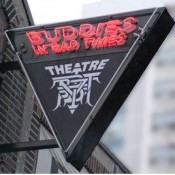It’s been a great privilege to work so closely with Tawiah on the development of Obaaberima, beginning with its very first presentation as part of the Buddies’ Young Creators Unit (YCU) in 2009.
The YCU is a space for a new generation of queer artists to discover their voices. As the director of that program, it’s my role to help young artists find authentic expression for their ideas. As a matter of course, this new generation changes the landscape of queer identity, adding new depth and breadth to what queer culture looks, sounds, and feels like in our city. Meeting Tawiah four years ago, I recognized a singular artist who had a story to tell which I had never heard before.
The story was born from two potent images: the first, a young boy entranced by a painting of a woman in red high heels; without words to understand his burgeoning sexual identity, the boy could only make sense of his attraction to men by identifying a woman that lived within himself. The second was the well-worn image of a black man in an orange prison suit.
The process of creating this play has been one of slowly unpacking all the meanings, characters, and narratives contained within these images. It has been a truly collaborative process of creation: a cross-disciplinary as well as cross-cultural collaboration. With the contribution of each artist who has joined our creative team, we have discovered more about the story, what it means, and how it could be told. Kobena’s great musical talent and deep knowledge of Ghanaian music added a huge new creative vocabulary, using “traditional” means to tell a most untraditional story.
Obaaberima asks each of us to examine what parts of ourselves we have put behind bars, the ways in which we have been – or have allowed ourselves to be – imprisoned. It extends an invitation to each of us to risk living in the true fullness of who we are: to leave no part of ourselves behind.
My deep gratitude to Kobena, Michelle, and Camie for bringing so much to this new play; to our incredible stage manager Laura for managing – in addition to everything else – a constantly changing script; and to the whole production team here at Buddies. I also want to extend thanks to Adrian Whan and Jennifer Gillmor for their valuable creative contributions to the first workshop in 2010; to David Oiye and Erika Hennebury for programming that first workshop; to Ian de Souza for connecting me with Kobena, and to Brendan Healy for continuing to champion the project. Brendan’s astute questions, razor sharp instincts, and unwavering support have been essential to our creation process.
-Evalyn Parry

